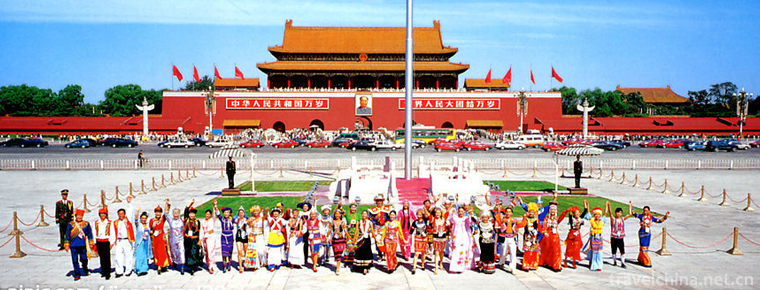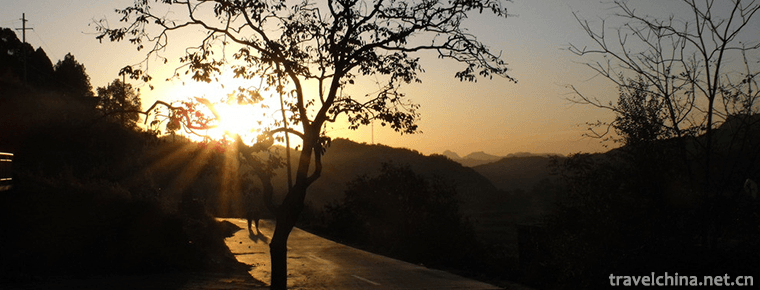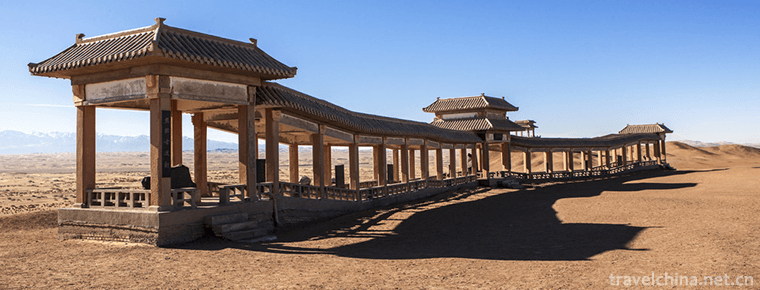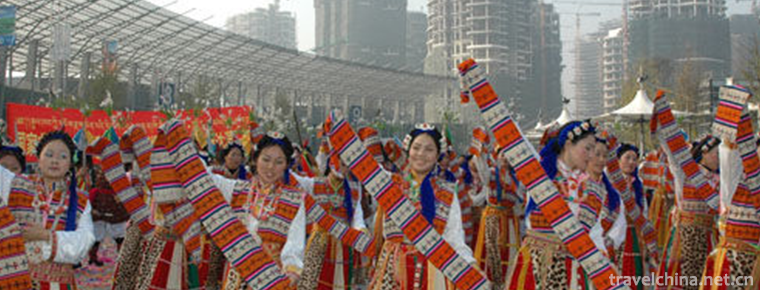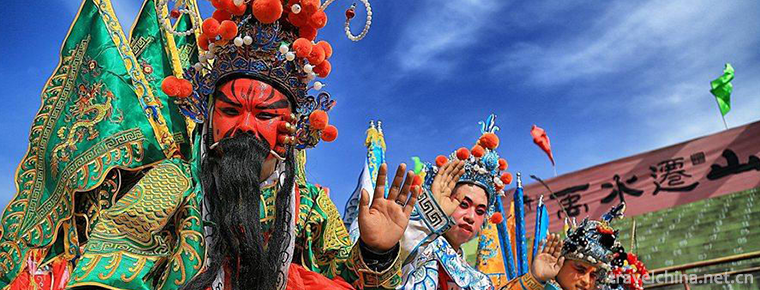Yangzhou Qingqu
Yangzhou Qingqu
Yangzhou Qingqu, also known as "Guangling Qingqu" and "Weiyang Qingqu", is a form of Musical Singing developed on the basis of popular songs and minors popular in Yangzhou during the Ming and Qing Dynasties. It is commonly known as "Xiaosong" or "Singing Xiaoqu". It is mainly popular in Yangzhou, Zhenjiang and Shanghai of Jiangsu Province and is performed in Yangzhou dialect.
Yangzhou Qingqu is traditionally a non-disguised, non-verbal and intangible performance, with a simple and simple style. Among them, the most valuable is music, which originates from local minors, and also includes minors from all over the country, rich in folk and regional characteristics.
On May 20, 2006, the opera was approved by the State Council and listed in the first batch of national intangible cultural heritage list.
Historical Evolution
Yangzhou Qingqu originated from Xiaosong in Yuan Dynasty. It was formed in the middle of Ming Dynasty on the basis of Sanqu in Yuan Dynasty and absorbed various popular folk songs in Jianghuai area. Shen Defu of the Ming Dynasty, the title of the song in Wanli Ye's Edited Vogue Xiaoling, is mostly retained in Yangzhou Qing Opera and has become the most commonly used music card.
Yangzhou Qingqu reached its peak in the reign of Kangxi and Qianlong in Qing Dynasty (1662-1796). It is unprecedentedly rich and colorful in music cards, accompaniment of musical instruments and song albums. It became one of the most active operas in Yangzhou opera and opera circles at that time, and was famous for its delicate tone, lingering and lyric.
After Daoguang in Jiaqing in Qing Dynasty, Yangzhou Zhaoqu Opera entered a declining period with the economic recession. A large number of urban residents who were well-off families were trapped in the plight of livelihood. They no longer had time and interest to go to the theatre, listen to books and taste operas. As a result, Yangzhou Qingqu lost a large number of audiences. In order to make a living, Qingqu artists had to lay down their Pipa and erhu and take up a new occupation which was easier to obtain means of living.
From the late Qing Dynasty to the Republic of China, due to frequent wars and economic depression, the situation of Qingqu art was quite difficult. However, due to the hard work of some Qingqu artists, Qingqu art has been preserved.
During the Anti-Japanese War, when Yangzhou was occupied, it was difficult for Qingqu opera players to make a living. For the first time, a group of famous artists, such as Zhou Xihou, Wei Shaozhang and Wang Wanqing, performed in the Laolongquan Tea Club of Yangzhou diocese and officially listed "Yangzhou Qingqu".
After the founding of New China, in addition to singing traditional songs, Yangzhou Qingqu artists have compiled and sung new songs such as "Resisting the United States and Aiding Korea" and "Three Woman Quaff". Around 1951, some highly skilled artists were absorbed by Yang Opera Troupe and Quyi Troupe. Yangzhou Quyi Troupe has established a professional Yangzhou Qingqu Team, trained a number of new actors, and compiled Liu Hulan and other repertoires.
During the Cultural Revolution (1966-1976), Yangzhou Qingqu was severely restrained: the professional team disintegrated, the artists were taught to change their professions, and the artists scattered. Since then, although there have been sporadic activities in Yangzhou Qingqu, the area has become narrower and narrower, and the artistic influence has tended to decline.
In 1986, Zhu Xiangsheng, the stationmaster of Guangling District Cultural Station in Yangzhou, led by Nie Feng, established the Friends of Qingqu in Guangling, and recruited two groups of Qingqu students free of charge to the society. These trainees have some advantages and are active in the urban and rural areas of Yangzhou, but later, due to difficulties in living and other reasons, some people gradually left the Qingqu Society. Nevertheless, Qingqu activities have not been interrupted. Ma Jinlin, Xu Shunying, Tao Meifang, Zhu Meilan, Taobo, Qian Mingzhu, Wang Zhaogen and others have been engaged in the singing, creation and inheritance of Yangzhou Qingqu.
Artistic Characteristics
Performing Form
Yangzhou Qingqu is a kind of sitting and singing performance. There are only one or two performers and more than 89 performers, and self-tuning instruments are accompanied by each other.
Its performance form is commonly known as "open seating": set a table in the middle, three or four people to six or seven people to sit around; face the audience. Each of them plays a musical instrument, solo or duet, without makeup or other props. In 1986, when the Yangzhou Quyi Troupe performed the newly compiled song "Mouse's complaint", the band sat on the side of the stage, while three singers sat in their long dresses with light makeup and knocked on the porcelain plates together. In the singing, there are performances with small range such as sitting and walking.
musical structure
The music structure of Yangzhou Qingqu belongs to two kinds of music types, namely, the suffix of music and the single music. There are many music brands and the melody is beautiful.
Yangzhou Qingqu is very rich in music cards, so far there are more than 100 kinds of statistics, including Palace tune, commercial tune, fine tune, feather tune and other modes. Its plate type is generally divided into one rigid eye, one rigid eye, three rigid eyes and seven rigid eyes. Singing is divided into a single and a set, the whole song only uses a single card for a single song, commonly known as "single piece". The melodious Southern Dialogue, Manjiang Red and Dressing Table are often used as singing single songs with hundreds of repertoires. It is called divertimento, which is composed of several pieces of music. The structure of divertimento is more complex. The most common structure is called "Five-petal Plum". That is to say, is used as the beginning, and is used as the end, with many other cards interspersed in the middle. Those who insert five or more pieces of music cards are called "small five-petal plum" and those who insert more than five pieces of music cards are called "big five-petal plum". In addition, there is a rare structure of collections, such as "Ten Langs" composed of eighteen pieces of cards, and "Nine Tunes and Eighteen Tunes" sung by ten different pieces of cards. These ways make the combination of Yangzhou Qingqu Qupai both regular and flexible.
The Characteristics of Singing
In the past, Yangzhou Qingqu artists were mostly male, and their singing skills were divided into "narrow mouth" and "wide mouth". Narrow voice is to imitate the female voice and sing the songs of female characters, while broad voice is to sing the songs of male characters in the original voice. When singing a more lively and witty tune, it is also called "splash".
Accompanied instruments
Accompanied instruments include four hus, two HUS and pipa. They can also be accompanied by percussion instruments such as piano, pendant and dishes, wine cups, etc.
Classic repertoire
Yangzhou Qing Opera is very rich in repertoire, there are more than 400, divided into single repertoire and divertimento. Single songs are mostly about scenery, lyrics, chanting things, Acacia and so on, such as "Wind, Flowers, Snow, Moon", "Acacia in Four Seasons", "Qing and Weather", "Fireworks Sigh" and "Bamboo and Wood Struggle". The divertimento is mostly based on folklore and historical stories, such as "Three Kingdoms", "Water Margin", "Story of the West Chamber", "Dream of Red Mansions" and "Biography of White Snake". "Pearl Tower" and so on.
Epidemic areas
Yangzhou Qingqu originated in Yangzhou, the central city of the Yangtze-Huaihe region, and mainly spread in Yangzhou, Zhenjiang, Nanjing, Suzhou and the vast northern Jiangsu region; it also spread in Shanghai, Shandong, Anhui, Yunnan and other provinces and cities; it also spread to Hong Kong, Taipei and other places during the Republic of China.
Inheritance and Protection
Current situation of circulation
Before liberation, Yangzhou Qingqu artists did not form professional groups. But those who often sing together often form a game. After liberation, artists began to organize. Jiangsu Quyi Troupe and Yangzhou Quyi Troupe absorbed Qing Quyi artists and trained a group of new artists. Qingqu opera workers also created a number of new albums, such as Liu Hulan, Workers, Peasants and Soldiers, Anti-American Aid to Korea and so on. But since the mid-1960s, this ancient song species has been on the verge of extinction.
protective measures
The protection of Yangzhou Qingqu was carried out earlier. Since the 1950s and 1960s, the investigation of Yangzhou Qingqu and the collection of historical materials such as albums and music scores have yielded results; sporadic artists and enthusiasts scattered all over Yangzhou have also been organized to start training, and a "Friends of Guangling Qingqu" has been set up to start team activities; and related to Yangzhou Qingqu. The "Art Seminar" has also been held many times, especially the establishment of "Yangzhou Qingqu Research Association", "Yangzhou Qingqu Database", "Yangzhou Qingqu Heritage Institute", "Yangzhou Qingqu Historical Heritage Museum" and other historical materials and institutions, which provide many related platforms for the protection of Yangzhou Qingqu; compilation of various books, periodicals, CD-ROMs, etc. The production and publication of Yangzhou Qingqu plays a valuable role in preserving and utilizing the materials, works and research results of Yangzhou Qingqu. The protection of Yangzhou Qingqu has achieved remarkable results, but due to various reasons, the inheritance crisis it faces also exists.
representative figure
Nie Feng is the provincial inheritor of Qingqu in Yangzhou. In 1960, he was admitted to Yangzhou Art School and studied Yangzhou Qingqu with Mr. Wang Wanqing. In 1986, with the help of Zhu Xiangsheng, then the stationmaster of Guangling Cultural Station, Nie Feng established the Guangling Qingqu Society. Although it is an amateur group, it has attracted many people to participate. He sorted out all the Qingqu opera cards recorded in Yangzhou Painting Records, and also sorted out the suites such as Three Kingdoms. He has made great contributions to the modern inheritance of Yangzhou Qingqu.
Selected as a non-survivor
On May 20, 2006, the "Yangzhou Qingqu" declared by Yangzhou City, Jiangsu Province, was approved by the State Council and listed in the first batch of national intangible cultural heritage list.
The Value of Quyi
The inheritance of Yangzhou Qingqu for more than 600 years has retained a large number of popular songs since Yuan and Ming Dynasty. The preservation of some of the original words of popular songs is not only conducive to our understanding and research of ancient folk music and lyrics, but also has a rare understanding and research value on social, historical and cultural phenomena at that time. The performance style of Yangzhou Qingqu is not only popular, but also graceful and elegant, which is in line with the artistic characteristics of the folk art with narration as the main part and endorsement as the supplement. Its content is close to life, folk, popular with the masses, and has strong artistic aesthetic value. Due to the maturity of Yangzhou Qingqu art, it has also produced a nurturing effect on many other kinds of operas and even local operas, and provided a rare reference for the occurrence and development of these related operas and operas.

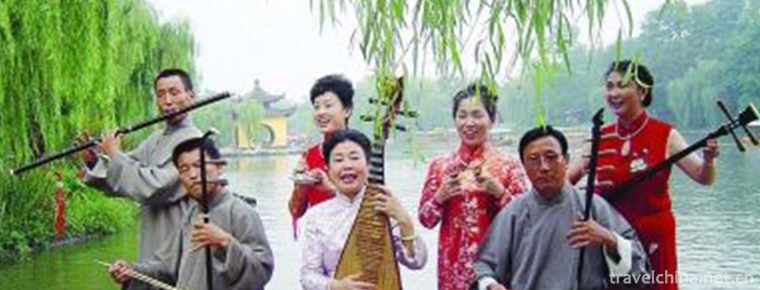
-
Tiananmen Square
East Chang'an Avenue, Dongcheng District, Beijing, China.
Views: 317 Time 2018-10-02 -
Lugu Lake
Lugu Lake, commonly known as Zuozuohai, the ancient name Lede Sea.
Views: 113 Time 2018-10-17 -
ShenxianjuImmortal residence
Shenxianju, a famous ancient mountain, is also known as Weiqiang Mountain. Now it is a national 5A scenic spot. There is the title of He Shu's calyx in Qianlong period of Qing Dynasty.
Views: 212 Time 2018-12-07 -
Seven Stars Scenic Spot
Seven Stars Scenic Spot/Qixing Scenic Spot is located on the East Bank of Lijiang River in Guilin City, along Xiaodong River, a tributary of Lijiang River, 1.5 kilometers away from the city center..
Views: 113 Time 2018-12-17 -
Xingtai Grand Canyon Tourist Area
Xingtai Grand Canyon is a national AAAA scenic spot, a national key scenic spot and a national geological park of China. It is located in Hejiaping Village, Luozhen, Southwest Road.
Views: 239 Time 2019-02-26 -
Yang Guan
Yangguan is the throat of ancient land transportation in China and the only pass along the southern Silk Road. Located in the southwest of Dunhuang City, Gansu Province.
Views: 133 Time 2019-03-03 -
Yinghu Scenic Area
Yinghu, a national AAAA-level tourist area, is located 16 kilometers southwest of Ankang City, Shaanxi Province. The total area is 102.8 square kilometers, including 77 square kilometers.
Views: 165 Time 2019-03-05 -
Castawin Dance
Castawin Dance, a traditional dance in Heishui County, Sichuan Province, is one of the national intangible cultural heritage..
Views: 191 Time 2019-05-08 -
Folk fire Min Jian She Huo
Folk society fire is a kind of folk entertainment popular in China during the Spring Festival. It is widely spread in Shaanxi, Shanxi, Hebei, Henan, Liaoning and other provinces. On May 20, 2006, Folk.
Views: 155 Time 2019-06-05 -
Siguniang Mountain Scenic Area
Siguniangshan scenic area, located in Siguniangshan Town, Xiaojin County, Aba Tibetan and Qiang Autonomous Prefecture, Sichuan Province, belongs to Qionglai mountain range of Qinghai Tibet Plateau, 220 km away from Chengdu..
Views: 149 Time 2020-11-06 -
Dispute on the meaning of Cheongsam
Under the influence of the Qing Dynasty's Qiren's robes, women's gowns have been referred to as cheongsam since the Republic of China. Due to the influence of the environment at that time, most people know that the women of the Manchu and Qing Dynasty had their own cheongsam,.
Views: 121 Time 2020-12-11 -
Population of Guangan
At the end of 2019, the total registered residence of Guang'an was 4 million 593 thousand. Among them, the rural population was 3.424 million, the urban population was 1.169 million, the birth population was 47900, and the death population was 5310.
Views: 245 Time 2020-12-19
